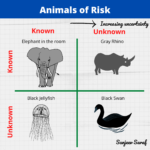Check valves are commonly used in the process industry for preventing back-flow or reverse flow.
Check valves achieve unidirectional flow by means of a mechanical partition – ball, diaphragm, disc.
When to Consider Check Valve Failure?
I can think of at least two occasions when you need to consider check valve failures and design for it.
- Overpressure: If there is considerable pressure difference across the check valve and failure of check valve will lead to an overpressure situation.
- Incompatible chemicals: If there is a situation where check valve failure can lead to mixing of incompatible chemicals






2 Responses
Another scenario is water hammer when you have an on/off valve downstream and the on/off valve closes abruptly with the pump running. This is not due to failure of the check valve, but due to quick closing characteristics of the valve.
Best solution is to have a modulating valve downstream instead of on/off valve, and slowly close it to lower the velocity and then shut it off.
Finally, if the system has high static column at the discharge, and the check valve fails during power failure and power is restored within a few seconds, the turbine effect causing a reverse flow may damage the motor which will try to rotate impeller the other way.